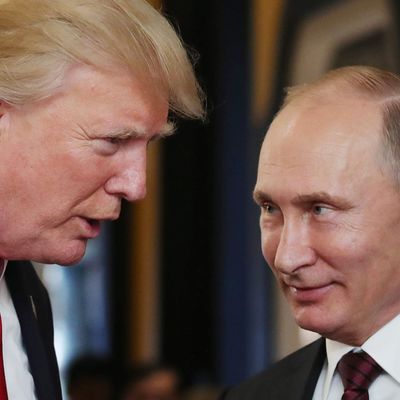
The Washington Post’s deeply reported account of Donald Trump’s pathological inability to acknowledge Russian intervention in the 2016 election is filled with devastating detail. Trump becomes agitated and irrational, and his national security advisers tiptoe delicately around the subject, which Trump invariably “would see as an affront.” His briefings are “often structured to avoid upsetting him.”
And yet, as humiliating as the treatment of the president’s fragile psyche may be, in its most important aspects, the account is exculpatory. The article raises the possibility that Trump’s consistent affinity for Russia could be explained by the kind of financial or sexual leverage Christopher Steele’s sources conveyed to him. Trump’s advisers instead offer somewhat less damning explanations.
The president’s aides “attribute Trump’s affection for Putin to the president’s tendency to personalize matters of foreign policy and his unshakable belief that his bond with Putin is the key to fixing world problems.” And the people he personally like happen to be dictators. “Who are the three guys in the world he most admires? President Xi [Jinping] of China, [Turkish president Recep Tayyip] Erdogan and Putin,” one Trump adviser said. “They’re all the same guy.” But most of all, he simply takes uncontrollable offense at the idea that his great victory was in any way tainted. “The president obviously feels … that the idea that he’s been put into office by Vladimir Putin is pretty insulting,” an administration official explains. When Congress approved retaliatory sanctions on Russia, Trump was “raging mad” and “apoplectic.”
This is an account of Trump as a petulant child, unable to think strategically or advance beyond his feelings of self-worth. Trump’s defenders have been using versions of this idea to explain his strange behavior toward Russia. Defining his behavior as a kind of childishness, though, also connotes an element of childlike innocence. Trump’s defenders have been making versions of this case for months.
“The frustration he feels is, he fully well knows there was no collusion with Russia. And yet, he’s been on the hot seat about it for six months,” Barry Bennett, a top campaign aide who continues to have ties to the White House, said in June. “Because Trump believes he is innocent, some advisers explained, he therefore does not think he is at any legal risk for a cover-up. In his mind, they said, there is nothing to conceal,” the Post reported in July. In August, The Atlantic’s David Graham argued Trump might be guilty, but it is also possible “that Trump truly believes that what’s going on is ‘the single greatest WITCH HUNT in American political history’ and is determined to kill the investigations, which he believes are unfair and hobbling his presidency.”
This is a perfectly sensible frame for analyzing the thinking and behavior of a normal person. But it is not a sensible frame for analyzing the thinking and behavior of Donald Trump. Both the Post and the Times reported last month on Trump’s habit of insisting even in private on defending obvious lies: that Barack Obama is not American, that Trump won the popular vote, that the voice on the Access Hollywood tape is not Trump’s. Surely Trump knows what he said to Billy Bush. He was there.
Trump either lies to absolutely everybody in his inner circle, or has the absolute power of self-delusion, sufficiently strong that his most apparently sincere protestations of his innocence mean nothing at all. The president might truly “believe” — whatever such a word means in relation to Trump — he is the victim of a witch hunt or that his enemies are using Russia to discredit his “massive landslide.” He might legitimately feel insulted by any mention of Russian hacking, and truly unable to assimilate foreign-policy discussions on an adult level. But it’s quite possible his hair-trigger anger over the subject of Russia is a tactic designed to close off a subject on which his guilt runs very deep.






























